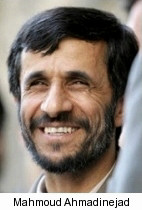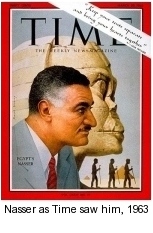At daggers drawn with 'demonized flesh' (3)

Murray Dixon and the specter of Christian Zionism
PART THREE - Twisting the history of the Middle East
In view of the deep-seated contempt for Islam, it is not surprising that someone like Murray Dixon invariably comes up with the worst possible interpretation of Arab / Muslim actions. For instance, in the Page 1 article in the Manawatu Standard on July 26, 2006, on the reaction of Lebanese people to the Israeli leaflets telling them to flee their homes, he said: "And we've seen on television — you may have too — they have these leaflets and have just torn them up and laughed (emphasis added)."
Where others, myself included, saw the actions as gestures of contempt or defiance — perfectly understandable feelings in the circumstances — Dixon professed to see only inappropriate levity. Elsewhere in the article, he drew a distinction between Hezb Allah and the Lebanese by saying that when Israel pulled out of the south of Lebanon a "few years ago", Hezb Allah moved into the "vacuum" and then proceeded "to [push] Lebanese out of their homes". In reality, the members of Hezb Allah are Lebanese, and were in south Lebanon throughout the Israeli occupation of 1982-2000. It is also highly ironic that Dixon leveled the charge of evicting civilians against Hezb Allah at a time when hundreds of thousands of Lebanese were being driven from their homes by the Israelis. He claims that Israel launched its assault partly because — in the words of the article — it "has had rockets being fired over the border for a long time and has had enough". But only four of the 19 border incidents listed by the Israel Ministry of Foreign Affairs between May 2000 and July 2006 involved the (localized) use of rockets by guerrillas in Lebanon; and as Nazareth-based British journalist Jonathan Cook pointed out in his article in Al-Ahram Weekly, August 3-9, 2006, Hezb Allah "paused five days, while Israel wrecked Lebanon with aerial bombardment, fulfilling its promise to 'turn the clock back 20 years', before raining down its rockets on Haifa".
Dixon also claims — again, in the words of the article — that "the whole of Israel is behind the army and what it is doing". Yet there was a demonstration by peace activists outside the Ministry of Defence in Tel Aviv within hours of the attack on Lebanon (see above picture). And Gush Shalom was vocal in its opposition to the invasion, seeing it (as it said in advertisements in Ha'aretz on July 25 and 26) as a replay of Ariel Sharon's 1982 adventure. Zeev Maoz, writing in Ha’aretz on July 24, saw a "wall-to-wall consensus . . . that the war against the Hezbollah in Lebanon is a just and moral war", but added that it "is based on selective and short-term memory, on an introverted world view, and on double standards".
The misplaced page of time

Toward the end of the article about Dixon, he claims Hezb Allah, Hamas and Iran seek the destruction of Israel, and says: "There is no question about [this]. It has been made very clear." But in the case of Iran — the only listed power with the potential to threaten Israel's existence — the official position is far from clear, and many questions have been asked about it. Iranian President Mahmoud Ahmadinejad has been reported around the world, even by Aljazeera, as saying that Israel should be "wiped off the map". But as Persian speaker Juan Cole, professor of modern Middle East history at the University of Michigan, has pointed out, this is not what he said. In fact, Cole maintains, the idiom "wipe off the map" does not even exist in Farsi. The following is from Cole's internet blog:
I object to the characterization of Iranian President Mahmoud Ahmadinejad as having "threatened to wipe Israel off the map." I object to this translation of what he said on two grounds. First, it gives the impression that he wants to play Hitler to Israel's Poland, mobilizing an armored corps to move in and kill people. But the actual quote, which comes from an old speech of [Ayatollah] Khomeini, does not imply military action, or killing anyone at all. The second reason is that it is an inexact translation. The phrase is almost metaphysical. He quoted Khomeini, [saying] that "the occupation regime over Jerusalem should vanish from the page of time". It is . . . probably a reference to some phrase in a medieval Persian poem.
Why, then, have so many people been quoting what Iranian Foreign Minister Manouchehr Mottaki has generously described as a "misunderstanding" (in comments at a press conference in Brussels on February 20, 2006)? The question has been addressed at great length by Anneliese Fikentscher and Andreas Neumann in Does Iran's president want Israel wiped off the map; does he deny the Holocaust?, where they say: "All this (distortion) indicates war. Slobodan Milosevic became Hitler. The result was the war of the Nato against Yugoslavia. Saddam Hussein became Hitler. What followed was the war the USA and their coalition of compliant partners waged against Iraq. Now the Iranian President becomes Hitler. . ." Bill Scher, executive editor of LiberalOasis.com, says "neocons are attempting to rerun the Iraq playbook for Iran", and continues:
Those agitating for war in Iran have repeated the alleged quote ad nauseam to make the case that Iran is irrational and cannot be dealt with diplomatically. And as I have noted on LiberalOasis before, the argument over whether Iran is rational or irrational is "the ballgame" between persuading the American public that either direct talks are worthwhile or we have no choice but to launch a military strike.

Alas, the truth is a poor competitor with a powerful, emotive lie. "Israel should be wiped off the map" will now find its way into the pages of sacrosanct history — where it will join that other execrable phrase, "Push all the Jews into the sea, dead or alive", which appears to have been first uttered not by an Arab leader but by Israeli Prime Minister David Ben Gurion in a speech to the Knesset on October 11, 1961, and which appears to have been nothing more than his presumption of the Arabs' intention. But was it their intention? And if it was, was it always their intention? Today, Arab / Palestinian hostility to Israel is assumed to be almost intrinsic to the "Arab mind"; yet in Land of Gilead (Blackwood, 1880), pioneer Christian Zionist Laurence Oliphant praises the "peaceful and docile" people of Palestine, whom he foresees working meekly as laborers ("hewers of wood and drawers of water", as in Joshua 9:23?) for future Jewish colonists from eastern Europe. How differently the future might have unfolded if the post-World War I colonists had not arrived with all the notions of racial and cultural superiority that Europeans took with them to Asia and Africa during the late colonial era.

Today, any suggestion that Zionism is in any way racist is greeted with outrage by Israel's supporters; yet in A Pilgrimage to Palestine (Student Christian Movement, 1928), Harry Emerson Fosdick says "Zionism is explicitly (emphasis added) not a religious but a racial movement" (Page 286), which seems to suggest that the Zionists were happy to call themselves racialists at a time when racialism was deemed acceptable — or even desirable. (Were any Westerners not into eugenics in the 1920s and 1930s?) In Palestine: The Reality (Longmans, Green and Co., 1939), British journalist J M N Jeffries says the Zionists regarded the Palestinians as "nobodies" — non-individuals in Laffin-speak — who would "vanish like the mist before the sun of Zion" (Page 42). And as late as 1949, in Promise and Fulfilment: Palestine 1917-1949, we find Arthur Koestler describing the Zionists as "colonizers" for whom "The presence of the Arabs was a mere accident like the presence of some forgotten pieces of furniture in a house which has been temporarily let to strangers".
Koestler also describes the takeover of Palestine not as a Jewish struggle for independence, but as a "conquest" (Page 35 of the 1983 Macmillan edition).

One is unlikely to find any of these terms in modern histories, in which an ill-fitting past is tailored to the ideals and perspectives of today. One is also unlikely to find any mention of the fact that the post-World War I colonists, who proclaimed a common cause with Jews who had settled in Palestine under the auspices of the Jewish Colonization Association in the late Ottoman period, were not welcomed by their forerunners, who "viewed political Zionism with suspicion and disfavor, and feared that a large influx of Jewish immigrants with political pretensions would endanger their good-neighborly relations with the Arabs" (ibid. Page 36). The indigenous Jews of Palestine also reacted negatively to Zionism, for the same reason.
In the Manawatu Standard article under discussion, Dixon also overlooks Israel's role in the creation of the first two enemies in his list. Israel actively encouraged Hamas at one stage, seeing it as a counterweight to the secular Palestine Liberation Organization, and knowing that an Islamized enemy could be discredited without difficulty in the Islamophobic West — especially if Islam could be trivialized through, for example, puerile piffle about the Muslim male's alleged obsession with the paradisiacal promise of 72 virgins. Israel also created the conditions in which Hezb Allah arose in Lebanon, not only by invading the country in 1982 but by ruthlessly oppressing its people during the 18-year occupation. In both cases, having an opponent who can be portrayed as "fundamentalist", "extremist" or "terrorist" is to Israel's advantage, because it can then claim it doesn't have a "negotiating partner" — and can take unilateral action.
When Palestinian "president" Yassir Arafat blundered into the role of Israeli collaborator, the prospect of a settlement in mandate Palestine, albeit one that would give the corrupt "Palestinian Authority" little more than rubbish-collection rights in 6.6 percent of it, proved intolerable. Arafat had to be undermined and insidiously destroyed, and in time he was. The "peace process" — the Oslo Accords of August 20, 1993; the "historic handshake" on the White House lawn between Arafat and Israeli Prime Minister Yitzhak Rabin on September 13, 1993; the Nobel Peace Prize for the "peacemakers" on October 14, 1994 — was all a charade. But for Israel, it was an important charade, because it can't claim the moral high ground, as it oppresses the Palestinians, unless it can contrive to show that they are responsible for their own misfortunes — that they were presented with a series of conciliatory offers, and either turned them down or accepted them and then treacherously failed to live up to their terms. This has been the Zionist strategy since 1947, if not earlier.

It is often stated that the Israelis accepted the United Nations Partition Plan for Palestine of November 29, 1947, while the Palestinians rejected it.

This is not true. In reality, both parties rejected it, but the Israelis pretended to accept it. The policy of the Zionists, who acquired only about 6% of Palestine by legal means (see United Nations Map No 94[b] of August 1950), was to accept whatever was offered (since they had nothing to lose by doing so), consolidate their hold on it, and then reach out for more — while posing as the aggrieved party, the hapless victims of "genocidal" Arabs. That is why the Arab leaders' rabble-rousing rhetoric during the ascendancy of secular Arab nationalism — and in particular the bellicose oratory of Egyptian President Jamal abd al-Nasir ("Nasser") between 1965 and 1967 — was so disastrous for the Arab countries. It may have been no more than bombast, designed for domestic consumption, but it could be made, especially with judicious editing by Western journalists, to look like evidence of a genuine threat, which could then be used to justify a "pre-emptive" strike. In the case of Nasser's speech of May 26, 1967, the words "If Israel attacked Syria or Egypt . . ." were edited out of most Western newspaper reports of the statement, which continued ". . . the war would be total. The objective would be the destruction of Israel." The clause that made the threat conditional thus did not become widely known. But that issue aside, the threat was ridiculous, for reasons that John Bagot Glubb (Glubb Pasha), former commander of the (Jordanian) Arab Legion, explains in Peace in the Holy Land: An Historical Analysis of the Palestine Problem (Hodder and Stoughton, 1971):
Every soldier with any knowledge of the Middle East knew that Egypt could scarcely resist Israel for a few hours. As early as 1957, I had estimated her resistance at forty-eight hours. . . The Pentagon seems to have thought the same (Page 329).
This pitiful army, "a large part [of which] was far away in the Yemen", was thus the force against which, according to what passes for history in the West, the Israelis had to fight for their survival between June 5 and June 10, 1967, and against which they achieved their "miraculous" victory. In Israel itself — as is invariably the case — there was a more realistic appraisal of the situation, as Newsweek reported on June 19, 1967:
When battle commenced, [Israeli Defense Minister] Moshe Dayan was ready with a private prediction. "I suppose," he said, "that we will be at Sharm el Sheikh and finish up there sometime the night of the seventh or eighth." Dayan was wrong. To his vast delight, Israeli troops had taken Sharm el Sheikh's key positions by the afternoon of June 7.
In an interview with Le Monde on February 28, 1968, (then) General Rabin admitted:
I do not believe that Nasser wanted war. The two divisions which he sent into Sinai on May 14 would not have been enough to unleash an offensive against Israel. He knew it, and we knew it.
Three years later, on April 14, 1971, Mordecai Bentov, a member of the Israeli coalition government during the 1967 war, said in a statement in the Israeli newspaper Al-Hamishmar:
The entire story of the danger of extermination was invented in every detail, and exaggerated a posteriori to justify the annexation of new Arab territory.
General Matetiyahu Peled said much the same thing in a speech to a political literary club in Tel Aviv, as reported by Amnon Kapeliouk in Le Monde on June 3, 1972:
The thesis according to which the danger of genocide hung over us in June 1967, and according to which Israel was fighting for her very physical survival, was nothing but a bluff which was born and bred after the war.
Arafat as ghetto policeman

Today, the only thing that is surprising about the Oslo Accords, which supposedly provided a framework for a solution of the Israel-Palestine problem, is that the duffers on the Nobel Peace Prize Committee (with the exception of dissenter Kare Kristiansen), and almost all Western "experts" on the Middle East, saw the agreement as something that would fly. In reality, it was a non-starter. Arafat was set up to fail. There was no way in which he was going to be able to perform to Israel's satisfaction as its glorified ghetto policeman in the scraps of territory that would comprise his impoverished domain. As I said in a satirical poem, The Ballad of Yasser Arafat, published in Crescent International on September 1, 1997, the despotic "Sergeant Arafat" would in due course be "busted to corporal".
Even those who were not admirers of Arafat can appreciate his predicament in the early 2000s, which [the late] Israeli scholar Tanya Reinhart outlines in Israel / Palestine: How to End the War of 1948 (Allen & Unwin, 2002):
Although it was obvious that there wasn't much Arafat could do about terror when Israel's brutality was daily generating new, desperate human bombs and he himself was under siege and his police forces paralyzed, Israel and the US — accompanied for a while by the European Union — nevertheless kept urging him to "act".
The Manawatu Standard article about Dixon continues, two paragraphs later, with more Laffinesque analysis:
From a Muslim point of view, pulling out of Gaza a year ago and Lebanon about six years ago was a sign of weakness — that the Israelis couldn't cope with it anymore, he (Dixon) said, "instead of [looking at it as] being a move towards trying to get a peaceful resolution to it all.
As the tedious, neocolonial experts on the "Muslim mind" never tire of telling us, the only thing the Muslim understands is force, the only thing he respects is strength. Show any sign of "weakness", and he will immediately take advantage of it. But was Israel really seeking peace when it pulled out of Gaza? It certainly marketed disengagement as a step toward peace, but as George Bisharat noted in the Baltimore Sun on August 17, 2006: "Palestinians remembered the October 2004 comment of Dov Weisglass, adviser to former Israeli prime minister Ariel Sharon: 'The disengagement is actually formaldehyde. It supplies the amount of formaldehyde that's necessary so that there will not be a political process with the Palestinians'." The reality is that Israel would have liked to annex the Gaza Strip, but knew it couldn't do so without absorbing 1.4 million Palestinians and thereby jeopardizing its status as a Jewish state. It also knew that its "magnanimous" concession in Gaza, an area of peripheral concern, would smooth the way for further consolidation of its control of the West Bank and East Jerusalem, which are crucial to realization of the Zionist dream and, incidentally, to the Christian Zionist desire to set the stage for the Parousia or Second Coming.
The reasons for Israel's withdrawal from Lebanon in 2000 were summarized on May 24 of that year by Nitzan Horowitz, Washington bureau chief of Ha'aretz: "I think . . . that simply Israelis are fed up with this occupation, what we call in Israel the Lebanese mud. Israel tried all the different approaches to Lebanon. They tried occupation, they tried brutal occupation, they tried to control with a local militia. They tried all sorts of methods. Nothing worked . . ." In other words, Israel faced the problem that all occupiers ultimately face: You either ethnically cleanse the territory you are occupying, or you get out.
● As if to prove that drivel knows no bounds, Murray Dixon was back, with more meretricious reporting, on October 10, 2006, when he informed readers of the Manawatu Standard that "Israel is an amazing country of extraordinary people". But his email, which was run in full by the Standard, was remarkable mainly for its reference to "the war of attrition in 1956". In reality, 1956 was the year of the Suez War, in which Israel, Britain and France launched a coordinated attack on Egypt. The War of Attrition ran from 1968 to 1970, and was between Israel and Egypt along the Suez Canal.

___________________________________________________________________________________
Article first appeared here: islamnz.com
URL: http://www.a-w-i-p.com/index.php/2010/08/08/title-50
























